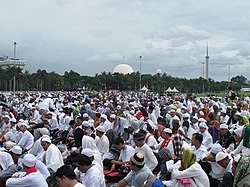Blasphemy law in Indonesia (Indonesian: Undang-undang Penistaan Agama) is the legislation, presidential decrees, and ministerial directives that prohibit blasphemy in Indonesia.
Blasphemy laws in the country have been adapted from the statutes of the Dutch East Indies, criminalizing those who deviate from the religious tenets of one of Indonesia's six official religions (Islam, Protestantism, Catholicism, Hinduism, Buddhism and Confucianism); from Presidential decrees, and been encouraged in the 21st century by "ascendant Islamic conservatives ... pushing hard-line policies."[1]
As the overwhelming majority of Indonesians (almost 90%) are Muslims, most blasphemy cases and convictions in recent years have been for blasphemy against Islam. Since the early 2000s, Blasphemy prosecutions and convictions have risen in the country,[1] but been criticized (by Amnesty International) for targeting religious minority groups and Islamic dissenters.[2]
Among the acts that have led to incarceration include reciting Muslim prayers in the Indonesian language;[3] using "paranormal healing methods" in drug and cancer treatment;[3] complaining about the volume of a mosque loudspeaker issuing call to prayer near the perpetrator's home;[4] eating pork rinds in a social media video;[2][1] serving free alcohol beverages for customers whose names were Muhammad and Maria.[5]
Basis in Indonesian law and society
Blasphemy laws in the country have been adapted from the statutes of the Dutch East Indies, the colony of the Netherlands that became Indonesia. The statutes apply to those who deviate from the religious tenets of one of Indonesia's six official religions: Islam, Protestantism, Catholicism, Hinduism, Buddhism and Confucianism.[1]
Criminal Code
Indonesia's Criminal Code prohibits blasphemy. The Code's Article 156(a) targets those who deliberately, in public, express feelings of hostility, hatred, or contempt against religions with the purpose of preventing others from adhering to any religion, and targets those who disgrace a religion. The penalty for violating Article 156(a) is a maximum of five years' imprisonment.[6][7] The blasphemy law has been "on the statute books since 1965 but was rarely used" before the end of the rule of President Soeharto.[8]
Presidential decree
Article 156(a) is the complement to a decree enacted by President Sukarno and implemented by President Soeharto, namely, Presidential Decree No. 1/PNPS/1965 on the Prevention of Blasphemy and Abuse of Religions. Article 1 of the decree prohibits the "deviant interpretation" of religious teachings, and mandates the President to dissolve any organisation practicing deviant teachings.[7] Until the end of the 20th century, Indonesian society was tolerant of Islam (88% of the population), Roman Catholicism, Protestantism, Hinduism, Sikhism, Buddhism, Judaism, and animism.[3] The Government was tolerant of persons with no religion, but does not count them in any census.[3]
Constitution
Article 29 of Indonesia's Constitution stipulates "the state is based on the belief in the one supreme God." The Constitution does not dictate which religion's version of God should be worshipped.[7] In January 2006, the Ministry of Religious Affairs accorded official status to six religions: Islam, Catholicism, Protestantism, Buddhism, Hinduism and Confucianism. On 9 December 2006, the House of Representatives passed a new civil registration bill requiring citizens to identify themselves on government ID cards as a member of one of the six religions.[3]
Indonesian Ulema Council
The Government formed a body of Muslim advisors, the Indonesian Ulema Council (MUI) in 1975, and continues to fund and appoint its members. The MUI is not formally a government body but it is influential. The Government considers the MUI's fatawa when making decisions or drafting legislation.[3] In July 2005, the MUI issued a fatwa that condemned the sect of Ahmadiyya as a heresy. In June 2008, the Ministry of Religious Affairs and the Home Ministry issued a Joint Ministerial Letter regarding the Ahmadiyya. The letter told authorities to restrict Ahmadiyya activities to private worship, and to prevent Ahmadi Muslims from proselytising. Provincial governors in West Sumatra, South Sumatra, and West Nusa Tenggara banned all Ahmadiyya activity.[6]
Conflict
Indonesia's laws and policies have produced many instances where members of one religion have persecuted the members of other religions or of other sects. Starting around the year 2000, the Islamic revival has reportedly "nurtured a small but growing number of groups espousing intolerance and extremism under the banner of Islamic orthodoxy."[6]
The authorities have not brought to justice many extremists perpetrators of crimes, crimes that are commonly justified by the perpetrators as actions against hatred, heresy, blasphemy, or deviance.[6][3]
In October 2009, a group of petitioners, including some human rights groups, requested that Indonesia's Constitutional Court review the 1965 Law on Blasphemy. On 19 April 2010, the Court announced its refusal to make the review. "If the Blasphemy Law was scrapped before a new law was enacted ... it was feared that misuses and contempt of religion would occur and trigger conflicts in society," Justice Akil Mochtar said. The Court offered an interpretation of the Law. The interpretation says the state recognises six religions, and "leaves alone" the followers of other religions.[9]

